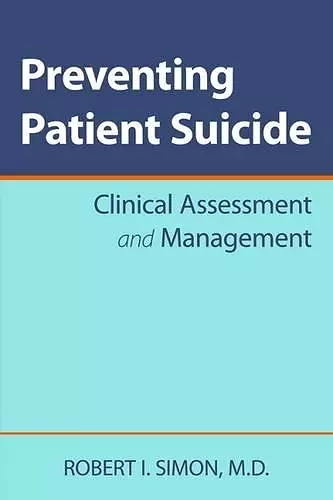Preventing Patient Suicide
Clinical Assessment and Management
Format:Paperback
Publisher:American Psychiatric Association Publishing
Published:23rd Oct '10
Currently unavailable, our supplier has not provided us a restock date

Today's psychiatrists practice in an environment that poses difficult challenges. Both treatment time and duration are limited by insurance requirements; many facilities are understaffed; split treatment arrangements are typical; and high-risk, acutely suicidal patients are admitted to inpatient units for short lengths of stay. In addition, law now plays a pervasive role in the practice of psychiatry. The doctor-patient relationship is no longer defined solely by the involved parties. Clinicians must juggle these requirements and limitations while providing the very best care to their patients, especially those at high risk.
Preventing Patient Suicide: Clinical Assessment and Management provides the wisdom of Dr. Robert I. Simon's vast clinical experience, combined with the latest insights from the evidence-based psychiatric literature, to offer a cutting-edge survey of suicide prevention and management techniques. The author:
• Addresses sudden improvement in high-risk suicidal patients, a phenomenon both common and perilous, with techniques for determining whether the improvement is real or feigned.
• Explores in depth the misuse of suicide risk assessment forms, with emphasis on their inherent limitations.
• Examines the many entrenched myths and traditions about suicide, exposing them to the critical light of evidence-based medicine, including the concept of "imminent suicide risk" and the myth of "passive suicide ideation".
• Discusses the continuum of chronic and acute high-risk suicidal patients, the fluidity with which one can become the other, and the difficulty in assessing these patients.
• Explores how the law and psychiatry interact in frequently occurring clinical situations, and the importance of therapeutic risk management.
In addition, the book contains a variety of features that illuminate the subject and enhance the reader's understanding, including:
• Inclusion of illustrative case studies, combined with commentary on commonly occurring but complex clinical situations.
• Key points at the end of each chapter that identify critical information.
• A Suicide Risk Assessment Self-Test, a teaching instrument that consists of fifty questions designed to enhance clinician suicide risk assessment by incorporating evidence-based risk and protective factors.
Dr. Simon provides a nuanced, empathic, yet pragmatic perspective on identifying, assessing, and managing the suicidal patient while successfully navigating a complex legal and clinical environment that poses its own risks to the practitioner.
Simon wades through the wealth of research on risk and protective factors with impressive agility, providing a heuristic checklist of individual, clinical, situational, interpersonal, and demographic factors to assess. More than this, he highlights the central importance of the therapeutic relationship as an agent of risk management and adaptive change.
-- Joseph J. Guido * PsycCRITIQUES *This book is an excellent source of information, not only for those new to seeing patients in mental healthcare settings, but also for veteran clinicians. Chapters are relatively brief, but contain volumes of evidence-based data meant to improve a clinician's knowledge, with the added benefit of improving patient safety. The chapter regarding suicide risk assessment forms is vital, and the chapters outlining a complete suicide risk assessment (i.e. including assessing positive factors against suicide risk) are very well done. Overall, this is an outstanding book typical of Dr. Simon's efforts.
-- Steven T. Herron, M.D., * Doody's Publishers' Club *I have reviewed a number of Dr. Simon's books, at least a few of which involve the topic of suicide (i.e.The American Psychiatric Publishing Textbook of Suicide Assessment and Management (American Psychiatric Publishing, 2006)), and this one is an excellent source of information, not only for those new to seeing patients in mental healthcare settings, but also for veteran clinicians. Chapters are relatively brief, but contain volumes of evidence-based data meant to improve a clinician's knowledge, with the added benefit of improving patient safety. The chapter regarding suicide risk assessment forms is vital, and the chapters outlining a complete suicide risk assessment (i.e. including assessing positive factors against suicide risk) are very well done. Overall, this is an outstanding book typical of Dr. Simon's efforts.
-- Steven T Herron, MD(CPI/Assurance Health and Wellness * DooISBN: 9781585629343
Dimensions: 229mm x 152mm x 12mm
Weight: 386g
235 pages